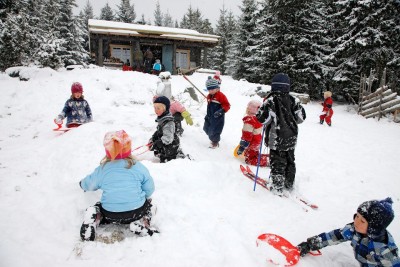Members of Norway’s ruling Conservative Party (Høyre) have reignited the debate over how old children should be when they start school. Education policy spokeswoman Kristin Vinje wants children to begin school when they’re five years old to make the most of early learning opportunities, but parent, teacher and student organizations strongly disagree.

School reforms in 1997-1998 brought the school-start age down from seven to six, and earlier this month, Norway’s largest business and employer group, NHO (Næringslivets Hovedorganisasjon) proposed mandatory day care or kindergarten for all five-year-olds at its annual conference, which this year had learning as its main theme.
Newspaper Aftenposten reported over the weekend that Vinje thinks education reforms should go one step further, and believes starting school at five years of age will drastically improve learning outcomes. That fired up the debate, which continued into this week.
“We see how much early effort means, and it’s important that we maintain a common arena for learning,” she told Aftenposten. “We have a great school system we can use to make sure everyone has the same opportunity to succeed. We benefit from people coming into their working life earlier; we’re quite old when we finish with education. On average, Norwegian women give birth late. I see this as a good solution for many.”
“There is no contradiction between being a child and having fun learning,” she continued. “I have four children, and they think it’s great fun to be challenged. There must be a balance between play and learning.”
No official plans
Vinje’s proposal to begin school a year earlier is not yet official Høyre policy. Education Minister Torbjørn Røe Isaksen, also from Høyre, said it’s an interesting idea, but there’s no platform to push reforms now. “Such a change would cost a lot,” he told Aftenposten. “We must hire more teachers and build more schools. But it’s an interesting discussion.” He wanted to hear further arguments and see an implementation plan before deciding if he’d support the proposal.
Conservative parliamentary deputy Nikolai Astrup said research showed early learning was important, and would be a positive for the community. But the reforms would be expensive. He said Norwegian children should actually spend fewer years at school. “When we introduced the school start age for six-year-olds, we went from 12 to 13 years of schooling, without students learning anything more,” he said. “A place to start could be to finish schooling after 12 years, and instead fill those years with more content.”
Henrik Asheim, who sits with Vinje on the parliament’s education committee, said research has shown children are very receptive to learning at a young age, and if the NHO wants compulsory kindergarten from the age of five it might make more sense to go straight into school instead. NHO said it’s an exciting debate which the organization has not yet discussed, so its policy is still for mandatory kindergarten.
Parents and teachers oppose
“We agree that early efforts are important, but we think that should happen on children’s terms,” said Terje Skyvulstad from the Education Association (Utdanningsforbundet). “Five-year-olds learn best in good kindergartens.” The Student Organization (Elevorganisasjonen) told Aftenposten it was surprised Vinje doesn’t seem to believe learning can occur before children start school.
The parents’ education committee (Foreldreutvalget for grunnopplæringen, FUG) said kindergarten teachers have expertise to handle five-year-olds’ needs. “The differences between five- and 12-year-olds are large, and there’s a high probability five-year-olds will get a teacher who can’t handle them,” said FUG head Elisabeth Strengen Gundersen.
Some researchers have also spoken out against the proposal, reported newspaper Dagsavisen on Tuesday. Peder Haug, education professor at Volda College, said that when the school start age was lowered to six, it wasn’t known if the reform would achieve the learning outcomes and social inclusion politicians hoped for. “We still know little about what has actually been the consequence,” he said. “It’s in no way proven that an even earlier school start will result in anything positive. On the contrary, international research suggests the opposite.” He believes the debate stems from general dissatisfaction with schooling outcomes, and while children can absorb a lot at a young age, starting school is not the answer.
Education professor and expert in young children’s development, Stein Erik Ulvund said such a move would create big differences between children. “Some will master a premature school start quite well, others will fail quite fast and risk very poor self esteem,” he said. “In the worst case it can damage children’s development.”
Politicians divided
Conservative Prime Minister Erna Solberg responded to her colleague’s proposal by saying there were many “funny suggestions” about what to do in schools, reported wire service NTB, but she was concerned with doing the most important things first. “We have quite a long list we wish to get underway before we begin to think about whether five-year-olds should go to school,” she said.
The parliamentary education committee chairman and former Labour Party (Arbeiderpartiet, Ap) minister Trond Giske said his party would be open to discussion on the topic. He told Aftenposten it was important to improve education opportunities for kindergarten children, but Labour hasn’t decided on the best approach.
Giske said for now, getting better expertise and improving the ratio of pre-school teachers to students was most important. The Progress Party (Fremskrittspartiet, FrP) supports a flexible school start age, but not mandatory schooling for five year olds, while the Socialist Left (Sosialistisk Venstreparti, SV) and Christian Democrats (Kristelig Folkeparti, KrF) are firmly against the proposal.
newsinenglish.no/Emily Woodgate

